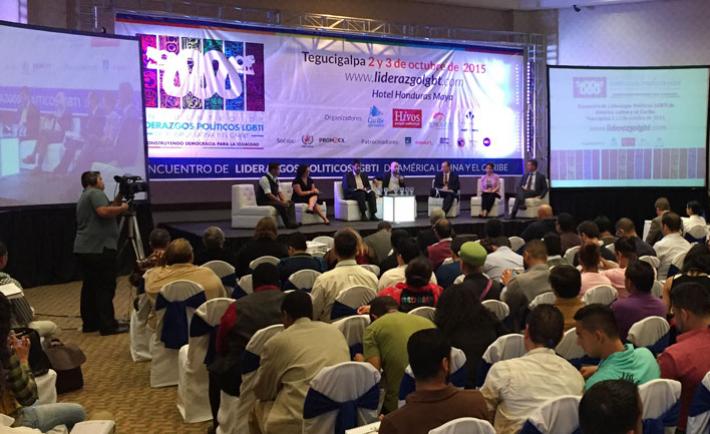“After Tegucigalpa, we will be a social movement,” declared Wilson Castañeda, the director LGBTI rights organization Caribe Afirmativo at the opening of the second annual Lesbian, Gay, Bisexual, Transgender and Intersex (LGBTI) Political Leaders Conference for Latin America and the Caribbean.
The gathering, held in the Honduran capital on October 2 and 3, brought together more than 300 LGBTI political leaders, activists and allies from across the region. Over two days of panels and workshops, participants discussed progress, challenges and best practices for increasing LGBTI communities’ political participation.
Organized by Castañeda’s Colombia-based organization Caribe Afirmativo, the Gay & Lesbian Victory Institute, Hivos International and Honduran LGBTI group Somos CDC, Tegucigalpa was more than just a gathering, it was a call to action. Participants came from 22 different countries with varying degrees of legal and social LGBTI inclusion -- from Barbados where same-sex relations is punishable by life imprisonment to Argentina where same-sex marriage and right to adoption have been legal for several years. They spoke from a range of local contexts that impact LGBTI political participation.
NDI served as a conference sponsor, with staff and partners from Colombia, Guatemala, Honduras, Nicaragua and Washington, D.C., in attendance. The focus on political representation closely coincides with NDI’s own approach to working with LGBTI groups, which is guided by the understanding that political participation is a primary means of addressing these communities’ social and economic marginalization.
Some of the topics explored were building alliances with faith leaders, forming more inclusive municipal governments, understanding the unique indigenous and Afro-descendent LGBTI experience and developing strategies for advancing gender identity legislation for transgender citizens.
On day two, NDI Colombia Director Francisco Herrero led a workshop on how LGBTI people can form, join and influence political parties to defend their rights and advance their equality. Panelists represented the growing cohort of openly LGBTI leaders from across the region. The event had a lot of firsts, including attendance by Randy Berry, the U.S. State Department’s first-ever Special Envoy for the Human Rights of LGBTI Persons; Carlos Bruce, the first openly gay member of Congress in Peru; and Arely Victoria Gomez Cruz, one of two transgender women to run for elected office in Honduras in a historic first in 2013. Representatives from six out of seven Honduran political parties discussed issues of importance to the LGBTI communities for the first time.
Despite differences in geography and experiences, several recurring themes emerged throughout the conference. One was the critical need for LGBTI groups to form coalitions with one another and build strategic alliances with other organizations, political parties, and government representatives who share their values. To truly build a social movement from the Tegucigalpa gathering, such partnerships will be key.
Another theme was the need to remain hopeful, despite halting progress and numerous setbacks for LGBTI political candidates and inclusion initiatives. As a reminder of this, Honduran Vice-Minister for Human Rights and Justice Karla Cueva concluded her plenary remarks with the iconic Harvey Milk quote, “Hope will never be silent.”
Finally, participants throughout the two days continually stressed that the protections, opportunities and responsibilities they seek are not special rights, but rather equal rights that should be afforded to all citizens.
Following the regional forum, one Honduran party activist thanked NDI for insisting on his political party’s participation. As a result, this participant was named the secretary for diversity issues for the party. Additionally, Honduran activists from different political parties who participated in the forum joined together to request political leadership training from NDI, because in their words, “together, we are stronger.”
These principles, as well as others expressed at the gathering, illustrate the strength and conviction of the growing movement for LGBTI equality in the region. In the lead up to the regional forum, NDI assisted Somos CDC to organize meetings with LGBTI organizations throughout Honduras. The goal was to arrive at consensus on a common advocacy agenda on national LGBTI issues, including prevention of violence against the communities and putting the brakes on possible rollbacks to the hate crime laws under the current penal code.
Continuing from Tegucigalpa’s momentum and looking ahead to next year’s meeting in Santo Domingo, LGBTI political leaders, activists and allies will be better able to use democratic practices and institutions as a means for advancing political inclusion.

